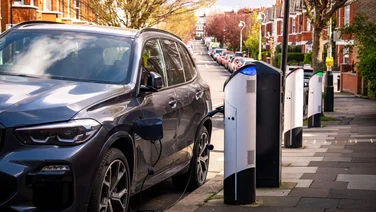Living sustainably is fast becoming a household priority, with 60% of UK residents wanting to go greener.
Unfortunately, whilst many of us work hard to cut down our own carbon footprint, there are still some companies out there pumping emissions into the atmosphere and tossing plastic into our oceans like theres no tomorrow.
In fact, just 100 companies are responsible for 71% of all global greenhouse emissions, according to a report published by the Carbon Disclosure Project.
So who are the top offenders? Just how much are these companies polluting the planet? And, most importantly, are they doing anything to turn things around? Lets take a look.
Methodology
Our two primary sets of data are from the Climate Accountability Institute and the Break Free From Plastic annual audit. These datasets have helped us narrow down which companies are creating the most emissions and dumping the most plastic waste around the globe.
We then calculated the emissions per capita, which is based on the size of the company, rather than focusing on the total damage done. This means that a companys habits wont just come down to the scale of its operations.
As companies become more polluting, they tend to be on the receiving end of public criticism leading some businesses to be a bit hazy when discussing their green credentials. As youll see further down, company sustainability reports dont always reflect reality.
The most polluting companies in 2023
Rank | Company | Billion tonnes of carbon dioxide equivalent since 1965 | Approximate number of employees | Tonnes of carbon dioxide equivalent per capita |
|---|---|---|---|---|
1 | Peabody Energy | 15.39 | 6,600 | 2,231,818 |
2 | Kuwait Petroleum Corp | 13.48 | 6,319 | 2,133,248 |
3 | ConocoPhillips | 15.23 | 10,400 | 1,464,423 |
4 | Chevron | 43.35 | 48,155 | 900,218 |
5 | Saudi Aramco | 59.26 | 79,000 | 750,126 |
6 | ExxonMobil | 41.90 | 74,900 | 559,412 |
7 | BP | 34.02 | 70,100 | 485,306 |
8 | National Iranian Oil Co | 35.66 | 87,500 | 407,542 |
9 | Royal Dutch Shell | 31.95 | 83,000 | 384,939 |
Data from various sites, including The Guardian, The Climate Accountability Institute, Statista, and company annual reports
Company breakdown
1. Peabody Energy
Company summary: Coal company
Based in: Missouri, United States
Founded: 1883
Emissions per capita: 2,231,818 tonnes or, 449,057 return flights from London to Sydney
Peabody recognises that climate change is occurring, and that human activity including the use of fossil fuels contributes to greenhouse gas emissions. We also recognise that coal is essential to affordable, reliable energy.
Despite this acknowledgement, not only is the company clogging the skies with CO2, but its also spent decades spreading disinformation about climate change. According to The Guardian, Peabody Energy has funded at least two dozen groups that cast doubt on manmade climate change and oppose environmental regulations. Like most things in life, the end goal of this was you guessed it money.
In an attempt to redeem itself, Peabody restored nearly one acre for every acre disturbed during mining in 2019. But is this really enough to make up for the devastation being caused? Were not so sure.
2. Kuwait Petroleum Corporation
Company summary: Petroleum company
Based in: Kuwait City, Kuwait
Founded: 1980
Emissions per capita: 2,133,248 tonnes or, 445,354 return flights from London to Sydney
Kuwait Petroleum Corporation produces about 7% of the world’s total crude oil. Recently, there has been a shift in demand for crude oil from Europe to Asia. There is also a rising global demand for refined products namely petrochemicals and natural gas meaning the company is showing no sign of slowing down.
In fact, to meet this climbing demand, Kuwait is expecting to invest AED500 billion (£38,118,091) by 2040, with the aim of boosting oil extraction and increasing petrochemical projects. So, despite being one of the worlds top offenders, Kuwait Petroleum is seemingly doing nothing to redeem itself.
3. ConocoPhillips
Company summary: Crude oil and natural gas
Based in: Texas, United States
Founded: 1875
Emissions per capita: 1,464,423 tonnes or, 305,725 return flights from London to Sydney
ConocoPhillips prides itself on the fact it has managed to reduce its emissions by almost 7 million tonnes per year since 2009 fantastic news, right? Well, when you compare this figure to its overall 15.23 billion tonnes of emissions, what youre left with is a measly 0.045% reduction in emissions.
And new plans in the pipeline are likely to cancel out any further emission reduction. A few months ago, the company signed off on a development plan in Alaska, which will, over its 30-year life span, produce approximately 586 million barrels of oil. Sadly, experts have said this could have potential impacts on caribou and other local wildlife species.
4. Chevron
Company summary: Oil and gas company
Based in: California, United States
Founded: 1879
Emissions per capita: 900,218 tonnes or, 187,936 return flights from London to Sydney
We proactively consider climate change risks and opportunities in our business decisions. We have the experience, processes, and governance in place to manage these climate risks and opportunities.
Sounds like a very environmentally conscious company, right? Unfortunately not. Chevron pumps out nearly 250,000 barrels of crude oil each day. Just two years ago, the company had to pay $9.5 billion for the repair of the social and environmental damage after the court found that Chevron deliberately dumped billions of gallons of toxic oil waste in the Amazonian provinces of Sucumbíos and Orellana.
And when Chevron flares (i.e. burns unwanted gas), dark smoke spirals up and across California this alone led to more than 15,000 people in California seeking treatment in 2012 for respiratory distress after a factory fire.
Chevron was also one of the oil firms targeted in a campaign by the Union of Concerned Scientists in the US to stop funding climate disinformation.
5. Saudi Aramco
Company summary: Petroleum and natural gas company
Based in: Dhahran, Saudi Arabia
Founded: 1933
Emissions per capita: 750,126 tonnes or, 150,930 return flights from London to Sydney
From continuously improving operational efficiency and the environmental performance of our facilities, to pursuing low carbon energy solutions, and strategically investing for growth, we view sustainable practices as the best way to ensure our business remains viable for the long-term.
And yet, Saudi Aramco has totted up the largest overall sum of CO2e emissions in the world since 1965, now sitting at a horrifying 59.26 billion tonnes. This company alone has contributed to about 4.4% of the worlds total carbon dioxide and methane emissions in the last 50-60 years.
Aramco is also expected to lead the growth in fossil fuel production between 2018 and 2030 its estimated that the company will produce 4.7% of the worlds carbon budget’, which is how much CO2e our planet can produce if we want to keep global temperatures from rising 1.5C above pre-industrialised levels.
6. ExxonMobil
Company summary: Oil and gas company
Based in: Texas, United States
Founded: 1999
Emissions per capita: 559,412 tonnes or, 116,787 return flights from London to Sydney
Our actions to address the risks of climate change are prioritized under the four pillars: mitigating emissions in our operations, providing products to help our customers reduce their emissions, developing scalable technology solutions, and engaging on climate change policy.
It was clear that Exxon had betrayed its very own principles back in 2015, when research revealed that the company had known about the causes and dangers of climate change since the 70s. Rather than taking action, Exxon spent decades pouring millions of dollars into disinformation campaigns designed to mislead the public.
In fact, Exxon has spent more than $30m over 30 years on think tanks that have promoted climate denial.
7. BP
Company summary: Oil and gas company
Based in: London, United Kingdom
Founded: 1909
Emissions per capita: 485,306 tonnes or, 97,647 return flights from London to SydneyFor many, these words will be overshadowed by the 2010 Deepwater Horizon rig explosion which sent 206 million gallons of oil from BPs Macondo well spewing into the Gulf of Mexico for 87 days. The spill killed 11 workers and millions of marine creatures triggering one of the worst environmental disasters in US history. At its height, 88,522 square miles of sea were closed to fishing because of the spill. A decade later, many species are still struggling in the area.
More recently, environmental lawyers have complained about BPs greenwashing advertising campaign, which portrayed the oil company in a sickly sweet light when it comes to the environment.
We understand that people around the world are increasingly concerned about air quality and its impact on public health. We monitor our air emissions, and put measures in place to reduce the potential impact of our activities on local communities.
8. National Iranian Oil Company (NIOC)
Company summary: Government-owned national oil and natural gas company
Based in: Tehran, Iran
Founded: 1948
Emissions per capita: 407,542 tonnes or, 82,000 return flights from London to Sydney
This once-thriving province of Khuzestan has been transformed into a wasteland, where the skies are smeared with pollution and dust storms continuously encroach towns.
The cause? Iran’s production of 4 million barrels of oil per day, and the flaring of around 39 million cubic metres of gas across the country. However, when people started to point fingers at the company for its impact on the toxic air pollution levels, Bijan Aalipour, director of the National Iranian South Oil Company (a subsidiary of NIOC), said:
“Putting all the blame on NIOC for the air pollution is nothing but a baseless allegation. We do not deny that oilfield activities generate pollution, but it is not as serious as they say.
9. Royal Dutch Shell
Company summary: Oil and gas company
Based in: The Hague, Netherlands
Founded: 1907
Emissions per capita: 384,939 tonnes or, 77,452 return flights from London to Sydney
Shell has let down environmentalists time and time again. In 2015, the energy company splashed roughly $22 million on lobbying activities against climate policies. Shell has also dumped roughly 1.5-2 million tonnes of waste into Busca Bay in Willemstad, which, to this day, is known as Asphalt Lake. And, in light of these transgressions, Shell has been aware of the impact fossil fuels can have for over 30 years.
To redeem itself, in 2019 Shell announced a $300m fund to invest in natural ecosystems over the next three years. However, this positive news is quickly washed away when you compare it with Shells annual income of $24bn, which goes into the investment of fossil fuels.
Is this 1.25% of profit going towards the environment simply a handout to keep environmentalists quiet? Quite possibly.
The top plastic polluting companies in 2023
Environmental organisation Break Free From Plastic conducted a study across six continents, collecting 429,994 pieces of plastic waste. They found that the top offenders have remained the same year after year.
Company | Examples of products | Number of countries plastic was found in | Pieces of plastic found |
|---|---|---|---|
Coca-Cola | Coca-Cola, Fanta, Sprite | 78 | 85,035 |
Pepsico | Pepsi, Lays, Doritos | 66 | 50,558 |
Nestlé | Nescafé, Kit Kat, Nestea | 64 | 27,008 |
Unilever | Persil, Cornetto, Sunsilk | 60 | 22,938 |
Mondeléz International | Oreo, Cadbury, Milka | 59 | 9,609 |
Are companies doing anything to change this?
Coca-Cola
- 90% of packaging is now recyclable this will hopefully be 100% globally by 2025
- Will use at least 50% recycled material in packaging by 2030
- Partnered with TerraCycle on the Loop initiative a refill service
Pepsico
- 88% of packaging is now recyclable, compostable, or biodegradable
- Educating and encouraging consumers to recycle
- Will cut virgin plastic use in products by 50% by 2030
Nestlé
- 85.8% of packaging is recyclable or reusable
- Aiming to make 100% of packaging recyclable by 2025
- Total weight of packaging in 2022 down by 4.5 million tonnes compared to 2020
Unilever
- All plastic packaging will be fully reusable, recyclable, or compostable by 2025
- Recycled plastic material in packing will increase to 25% by 2025
- Factories sent zero non-hazardous waste to landfills in 2022
Mondeléz International
- 100% of packaging will be recyclable by 2025
- Currently, 75% of all packaging is recyclable
- In 2019, cellophane and most PVC and black plastic was eliminated

Summary
While this article paints quite a bleak picture, its not all bad. Companies of all shapes and sizes are now looking to go carbon neutral not only to help the environment, but to seem more appealing to employees in many different countries.
Its important to remember that, as a consumer, you do have the power to change the future of these polluting companies. As more people switch to renewable energy, cut down on plastic, and live a little more sustainably, these polluting companies will have no choice but to change their habits to stay on trend.
Want to know more about how work practices can affect the environment? Read our article on the environmental impact of a four-day workweek.






